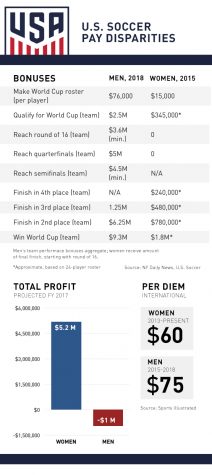US Soccer Resists Giving Equal Pay to Women’s Team
March 18, 2020
In the past few years, the US Women’s team has pushed through World Cup wins and sports sexism, a controversy that is getting headlines from the recent lawsuit from US Soccer. The lawsuit regards equal pay and is an attempt from US Soccer to prove that they are not discriminating against the women’s World Cup team on the basis of gender, which would be a violation of the Equal Pay Act. In the lawsuit, US Soccer argued that “The job of a [men’s national team player] carries more responsibility within US Soccer than the job of a [women’s national team] player”.
The men’s soccer team, although less successful than the women’s, get paid a significantly greater amount. US Women’s Soccer also won their fourth World Cup in France 2019 while the men’s team failed to qualify for the 2018 World Cup. Through the years 2016 to 2018, the women’s team generated $50.8 million compared to the $49.9 from the men. However, in 2016 (a year after the 2015 World Cup win) the women’s team generated $1.9 million more than the men’s team.

Even with all of the women’s success, US Soccer is still pushing back. The lawsuit states that female athletes are “less skilled” and work “less demanding jobs” than their male counterparts. US Soccer lawyers are using three main points to argue this claim:
Scientific Inferiority
US Soccer pointed to the biological difference between men and women. The corporation is using “indisputable science” as an argument as to why the women’s team should be paid less than the men’s. As the men’s team is anatomically stronger than the women’s, they are therefore assumed to have a greater physical demand and require a higher level of skill.
Individual players were questioned by US Soccer lawers as to if they were as strong or fast as the men’s team players. When asked if the women’s team could be competitive with the men’s, star player Carli Lloyd responded, “I’m not sure. Shall we fight it out to see who wins and then we get paid more.”
Player Alex Morgan, when questioned, states that it does not require more skill to be on the men’s team than the women’s, “It is a different skill.”
Male Supporters
US Soccer cited that male fans are generally more hostile, further evidence that the men’s players have more demanding jobs. This stems from supporters of other male teams, the US Men’s Soccer’s opponents. The US team’s opponents sometimes attract more supporters to games on US soil than the US team itself does, especially after failing to qualify for the 2018 World Cup.
FIFA Bonuses
There is also the argument regarding FIFA, the worldwide governing body of soccer, and the bonuses given to male and female teams. US Soccer argues that matching the women’s bonuses to the men’s would cause them financial harm. The US Women’s team is also arguing that their pay should not be associated with the bonus gap FIFA gives male and female athletes.
Senior athlete Caroline Lamoureux said, “It’s frustrating to see that very little progress is being made, especially when considering the massive success that our women’s team has consistently had in the past twenty years. I hope both men and women can see that this is blatantly sexist and unfair and that the women’s team deserves equal pay.”
The president of the US Soccer Federation has stepped down and apologized for the wording in the organization's legal response to the gender equality lawsuit brought by the Women's National Soccer team https://t.co/8zm6LkBM1w pic.twitter.com/urc3w4oMqC
— CNN Breaking News (@cnnbrk) March 13, 2020
Further, US Soccer president Carlos Cordeiro is facing criticism after he claimed that he and his organization offered an equal pay structure with the men’s team that the women’s team rejected. The aforementioned “equal pay” offer was based on a contract being negotiated in 2011 and was in the midst of being renegotiated. Cordeiro released a letter explaining this on the eve of one the teams’ biggest games (played on US soil in a sold-out New Jersey stadium) and International Women’s Day.

